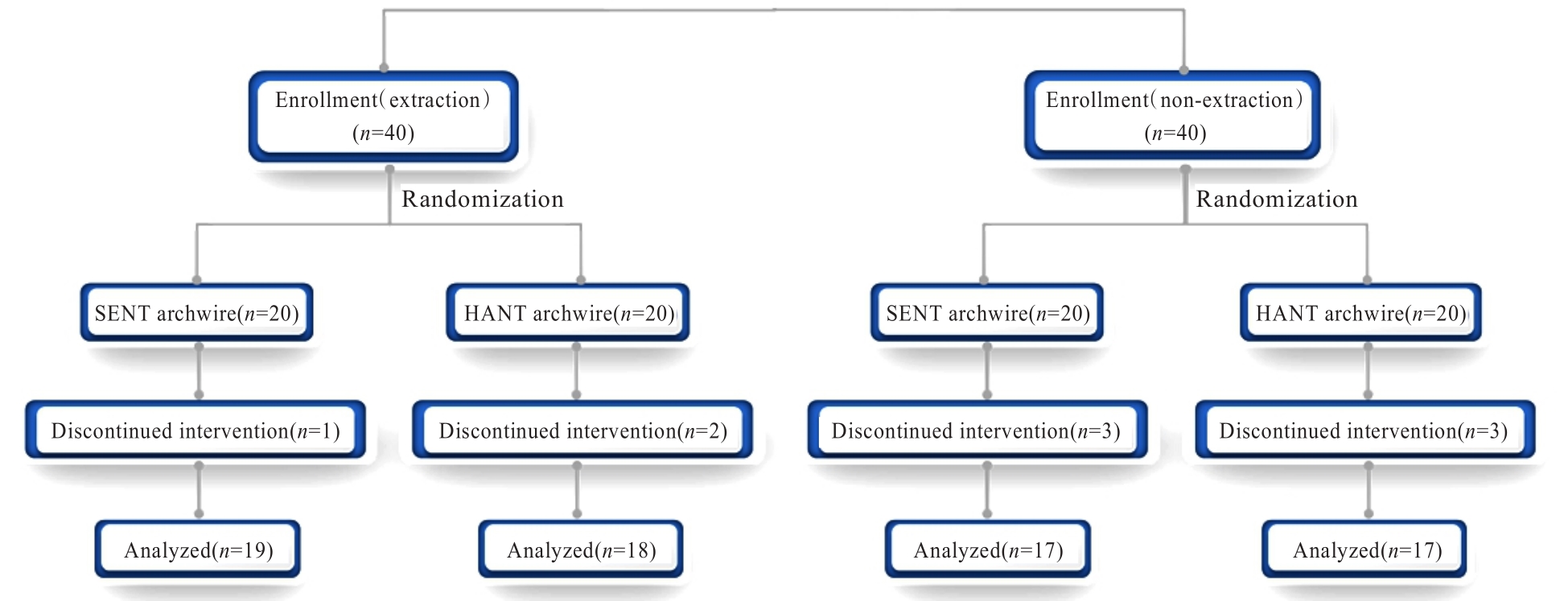| 1 |
YASSIR Y A, MCINTYRE G T, BEARN D R. Orthodontic treatment and root resorption: an overview of systematic reviews[J]. Eur J Orthod, 2021, 43(4): 442-456.
|
| 2 |
SANDHU S S, SANDHU J. A randomized clinical trial investigating pain associated with superelastic nickel-titanium and multistranded stainless steel archwires during the initial leveling and aligning phase of orthodontic treatment[J]. J Orthod, 2013, 40(4): 276-285.
|
| 3 |
BRANTLEY W A. Evolution, clinical applications, and prospects of nickel-titanium alloys for orthodontic purposes[J]. J World Fed Orthod, 2020, 9(3S): S19-S26.
|
| 4 |
SPINI T S, VALARELLI F P, CANÇADO R H, et al. Transition temperature range of thermally activated nickel-titanium archwires[J]. J Appl Oral Sci, 2014, 22(2): 109-117.
|
| 5 |
LOMBARDO L, MARAFIOTI M, STEFANONI F, et al. Load deflection characteristics and force level of nickel titanium initial archwires[J]. Angle Orthod, 2012, 82(3): 507-521.
|
| 6 |
KEERTHANA P, CHITRA P. Alleviation of lower anterior crowding with super- elastic and heat-activated NiTi wires: a prospective clinical trial[J]. Turk J Orthod, 2021, 34(2): 127-135.
|
| 7 |
NABBAT S A, YASSIR Y A. A clinical comparison of the effectiveness of two types of orthodontic aligning archwire materials: a multicentre randomized clinical trial[J]. Eur J Orthod, 2020, 42(6): 626-634.
|
| 8 |
MAHMOUDZADEH M, FARHADIAN M, ALIJANI S, et al. Clinical comparison of two initial arch wires (A-NiTi and Heat Activated NiTi) for amount of tooth alignment and perception of pain: a randomized clinical trial[J]. Int Orthod, 2018, 16(1): 60-72.
|
| 9 |
SERAFIM C M, GURGEL J D, TIAGO C M, et al. Clinical efficiency of two sequences of orthodontic wires to correct crowding of the lower anterior teeth[J]. Sci World J, 2015, 2015: 690280.
|
| 10 |
MACHIBYA F M, BAO X F, ZHAO L H, et al. Treatment time, outcome, and anchorage loss comparisons of self-ligating and conventional brackets[J]. Angle Orthod, 2013, 83(2): 280-285.
|
| 11 |
ABDELRAHMAN R S, AL-NIMRI K S, MAAITAH E FAL. Pain experience during initial alignment with three types of nickel-titanium archwires: a prospective clinical trial[J]. Angle Orthod, 2015, 85(6): 1021-1026.
|
| 12 |
KASSAM S K, STOOPS F R. Are clear aligners as effective as conventional fixed appliances?[J]. Evid Based Dent, 2020, 21(1): 30-31.
|
| 13 |
ROSSINI G, PARRINI S, CASTROFLORIO T, et al. Efficacy of clear aligners in controlling orthodontic tooth movement: a systematic review[J]. Angle Orthod, 2015, 85(5): 881-889.
|
| 14 |
JABER S T, HAJEER M Y, SULTAN K. Treatment effectiveness of clear aligners in correcting complicated and severe malocclusion cases compared to fixed orthodontic appliances: a systematic review[J]. Cureus, 2023, 15(4): e38311.
|
| 15 |
KE Y Y, ZHU Y F, ZHU M. A comparison of treatment effectiveness between clear aligner and fixed appliance therapies[J]. BMC Oral Health, 2019, 19(1): 24.
|
| 16 |
LITTLE R M. The irregularity index: a quantitative score of mandibular anterior alignment[J]. Am J Orthod, 1975, 68(5): 554-563.
|
| 17 |
KONG L, LI Y B, LIU Z J. Digital versus conventional full-arch impressions in linear and 3D accuracy: a systematic review and meta-analysis of in vivo studies[J]. Clin Oral Investig, 2022, 26(9): 5625-5642.
|
| 18 |
KANG S J, KEE Y J, LEE K C. Effect of the presence of orthodontic brackets on intraoral scans[J]. Angle Orthod, 2021, 91(1): 98-104.
|
| 19 |
DOWLING A H, BURNS A, MACAULEY D, et al. Can the intra-examiner variability of Little’s Irregularity Index be improved using 3D digital models of study casts?[J]. J Dent, 2013, 41(12): 1271-1280.
|
| 20 |
LIU C, WEI Z, JIAN F, et al. Initial arch wires used in orthodontic treatment with fixed appliances[J]. Cochrane Database Syst Rev, 2024, 2(2): CD007859.
|
| 21 |
ABDELRAHMAN R S, AL-NIMRI K S, MAAITAH E FAL. A clinical comparison of three aligning archwires in terms of alignment efficiency: a prospective clinical trial[J]. Angle Orthod, 2015, 85(3): 434-439.
|
| 22 |
SEBASTIAN B, ABRAHAM M E, SARMA P S, et al. Alignment efficiency of coaxial tubular superelastic nickel-titanium vs single-stranded superelastic nickel-titanium in relieving mandibular anterior crowding in extraction cases: a single-centre randomized controlled clinical trial[J]. Orthod Craniofac Res, 2019, 22(2): 105-111.
|
| 23 |
BANERJEE S, BANERJEE R, SHENOY U, et al. Effect of orthodontic pain on quality of life of patients undergoing orthodontic treatment[J]. Indian J Dent Res, 2018, 29(1): 4.
|
| 24 |
MARQUES L S, PAIVA S M, VIEIRA-ANDRADE R G, et al. Discomfort associated with fixed orthodontic appliances: determinant factors and influence on quality of life[J]. Dental Press J Orthod, 2014, 19(3): 102-107.
|
| 25 |
MARKOVIĆ E, FERCEC J, ŠĆEPAN I, et al. The correlation between pain perception among patients with six different orthodontic archwires and the degree of dental crowding[J]. Srp Arh Celok Lek, 2015, 143(3/4): 134-140.
|
| 26 |
HJERMSTAD M J, FAYERS P M, HAUGEN D F, et al. Studies comparing Numerical Rating Scales, Verbal Rating Scales, and Visual Analogue Scales for assessment of pain intensity in adults: a systematic literature review[J]. J Pain Symptom Manage, 2011, 41(6): 1073-1093.
|
| 27 |
NUNES L, QUINTANILHA L, PERINETTI G, et al. Effect of orthodontic force on expression levels of ten cytokines in gingival crevicular fluid[J]. Arch Oral Biol, 2017, 76: 70-75.
|
| 28 |
LUPPANAPORNLARP S, KAJII T S, SURARIT R, et al. Interleukin-1beta levels, pain intensity, and tooth movement using two different magnitudes of continuous orthodontic force[J]. Eur J Orthod, 2010, 32(5): 596-601.
|
| 29 |
ERDINÇ A M, DINÇER B. Perception of pain during orthodontic treatment with fixed appliances[J]. Eur J Orthod, 2004, 26(1): 79-85.
|
| 30 |
BHASIN V, SINGH M, GOUTAM M, et al. Comparative evaluation of myeloperoxidase enzymatic activity in gingival crevicular fluid of subjects having orthodontic treatment by different aligning arch wires[J]. J Contemp Dent Pract, 2017, 18(10): 977-980.
|
 )
)






